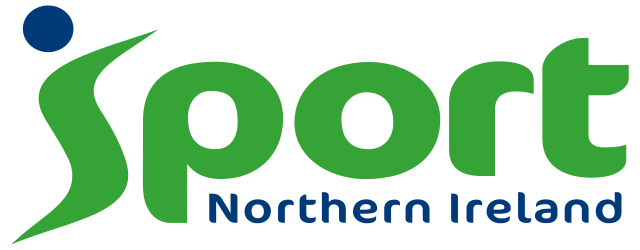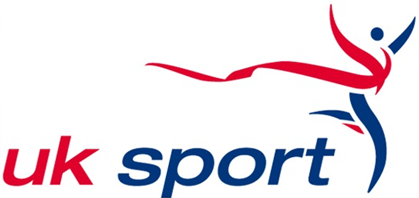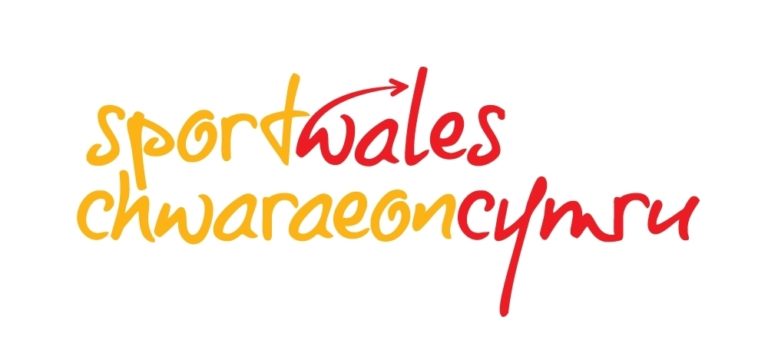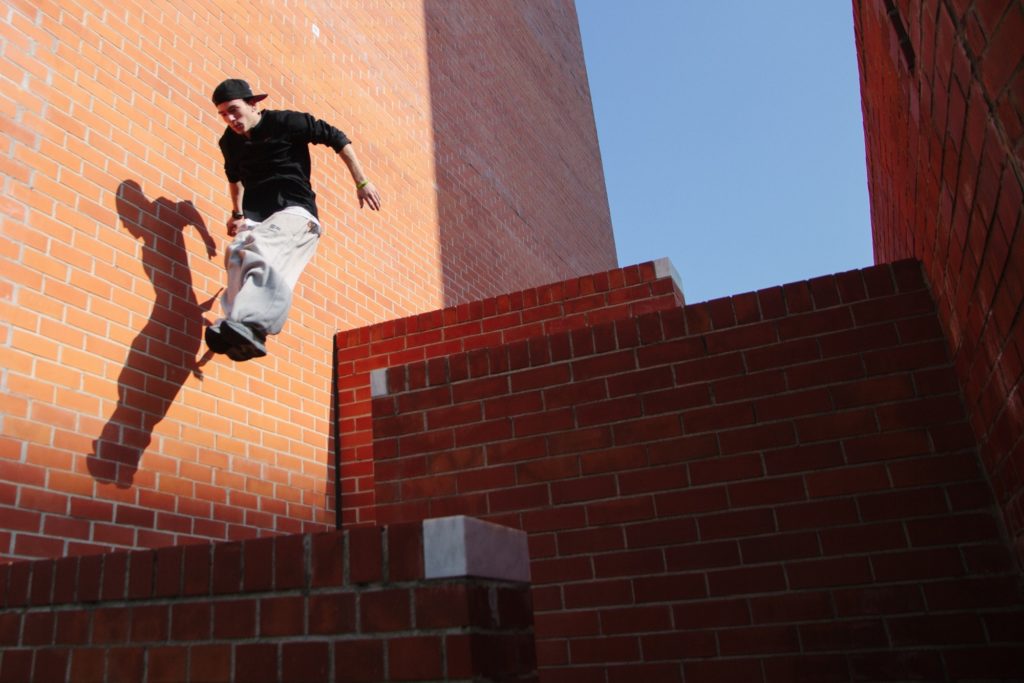
Training parkour solo has its benefits. When training on your own, you are entirely focused on yourself and the challenges set in front of you. It’s a really good way to test your mental game when it comes to training.
With that being said, like most sports, parkour sessions with a community or with your friends are always more entertaining than training on your own.

Like most lifestyle sports (skateboarding, rollerblading, scooter, etc) parkour has a huge focus on its community aspect. The sport of parkour is approaching an age of around the mid-thirties. On top of that, it is also one of the first sports that has grown in conjunction with the internet and social media.
Because of this, parkour has become a very tight nit sport. It isn’t uncommon for practitioners to be best friends or know other practitioners up and down the country, or even the world.
When starting parkour, however, this information is not necessarily common knowledge. Today, we are going to give you some tips for finding a parkour community in your area, or, if you are looking to travel somewhere for parkour, how to find local guides or spots within that area.
Google is the world’s largest search engine, but not many people know that YouTube, despite being a video-sharing platform, is actually also the second largest search engine.
You can utilise these tools to easily help you find classes, communities, groups, or spots in your local area.
A load of parkour communities loves the idea of people visiting their area to train parkour, and because of this, ‘spot maps’ have been created by these local communities.
A spot map is a Google Map that has a selection of ‘pins’ dropped onto it. These pins will be the locations of spots in that area. It’s perfect if you’re going to visit somewhere and don’t quite know where the good spots for training are.
Spot maps are definitely more common in big cities. seeing as these areas spread far and wide to the smaller towns on the outskirts too.
Parkour brand ‘Norml Brand’ recently featured a post of a London Parkour Spot Map. It’s huge. We’ve attached it below as an example.
It looks daunting at first, but after you nail down a particular area you would like to go to, it’s not as scary.
Let me give you an example of video searching. I started parkour in May 2012. When I started, I knew my town center had some spots, but I hadn’t quite developed that eye for training just yet. I visited the same three spots each training session.
I went onto YouTube and searched “My Location” followed by “Parkour.” In my case, Horsham Parkour. I stumbled across a tonne of videos from a small parkour group called Horsham Movement (who eventually became Storror… that’s crazy.) But these videos gave me a reference point of spots that were in the local town center.
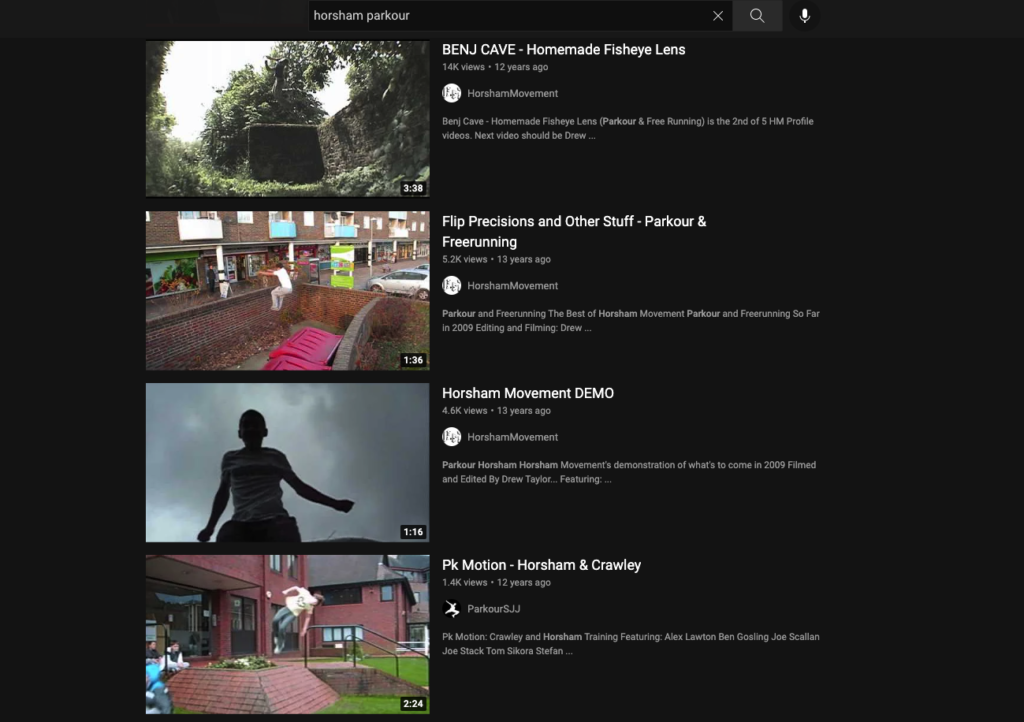
I also stumbled across a second group, called Parkour Sundays. This was back in the day when you could send messages on YouTube, so I reached out and sent them a message and was out training with them, later on, that week.
Sadly, YouTube has since removed the option to message your favorite channels personally, but fear not, there is a solution to all of this.
Facebook, Instagram, TikTok, are all called social networks for a reason. A social network enables a connection in both the real and digital world. As mentioned above, parkour’s growth has more or less mirrored those of social networks.

You can see this on Google Trends over time. When comparing ‘Parkour’ next to ‘Social Network’, with the red representing ‘social network’ and the blue representing ‘parkour’ you can see the two follow a similar search pattern (There is a spike in 2010, due to the release of the David Fincher film ‘The Social Network’)
In 2016, a lot of parkour practitioners took to Instagram after they started allowing video content to be published on the platform. This is covered in more detail in a video from ‘JimmyTheGiant’, which you can watch below.
The title of the video aside, the video goes into detail about parkour’s transition to social media.
Back to the topic at hand, many groups have social network accounts and are extremely active on them. If you have found a YouTube video or channel from practitioners in your area, have a look at the top right-hand section of their YouTube channel, or alternatively in the description of their videos. They should have a link to their social media accounts. Here, you can drop them a message and ask about meeting up and training.
Facebook also has a forum-like feature, where people can set up ‘groups’ for parkour in their local area. It’s always worth using Facebook a little bit like a search engine, and seeing what pops up concerning parkour in your local area.
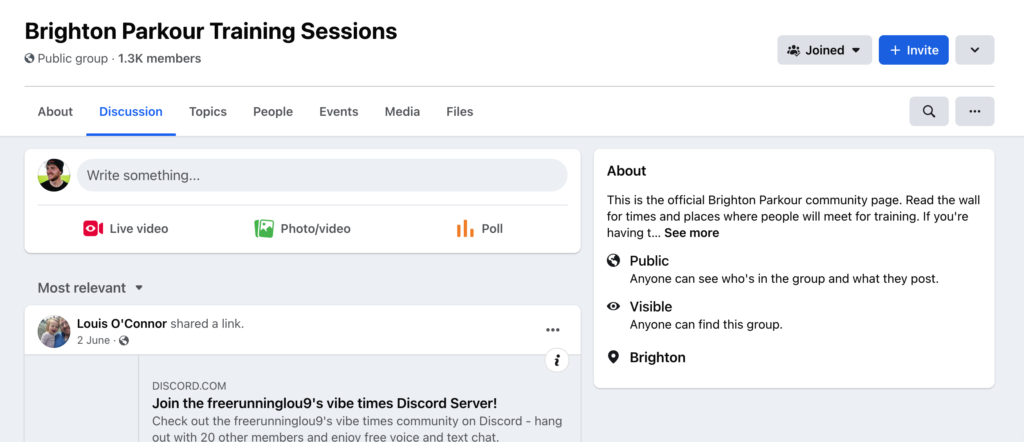
We also have a ‘Get Involved section on our website. Here you can search for your location, and it will bring up parkour parks, indoor facilities, and coaches and organisations that are in or close to your area. You can find that here.
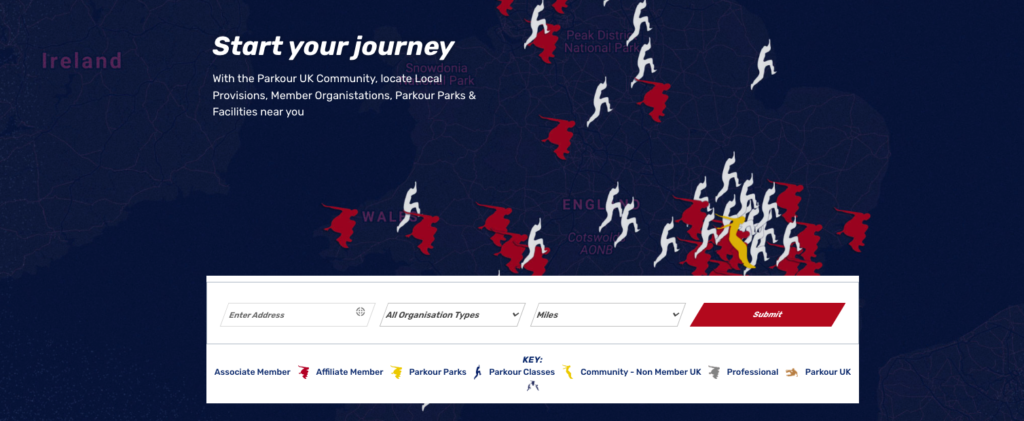
A great way to meet like-minded people is to attend parkour classes and sessions.
All over the country, there are parkour classes for all ages and abilities, with some facilities even hosting weekly ‘open jam’ sessions. This replicates outside training in a safe environment, where you can meet new people.
The coaches teaching parkour classes have years of experience within the parkour community, and the likelihood of some of these coaches being in a similar position to you is high. This could help you with spots in your local area, or let you know who the best person to contact is to arrange an outdoor session.
Some parkour coaching organisations even get involved in this themselves, making an effort to train outside with their students in order to help them start their parkour journey outside of the gyms. Team Reality, from Grimsby, does this almost on a weekly basis, where they upload videos to their YouTube channel following the session.
Without trying to go all business-like on you, networking is key. A load of practitioners within the community hold jam sessions, more so in the summer, and because of this, loads of the community share it around and show up. Making an effort to go to these events to meet other people who train in the sport helps blossom friendships that last for years.
There are some general unwritten rules to follow at a jam, which we will cover in a later post, but these events help you meet practitioners of all ages, abilities, and backgrounds, and friendships are spawned, meaning that if you would like to train with other people, you now have those connections dotted around the country to do so.
At Parkour UK, we promote the participation of all ages, genders, identities, orientations, and backgrounds.
We understand that currently, the sport is male-dominated. We also understand the hesitation that individuals may face when wanting to enter or participate in the sport.
We are incredibly proud and grateful that the parkour community has taken the step to eliminate the barriers to entry with classes and events for women, transgender & non-binary becoming a focus for individuals and organisations within our sport.
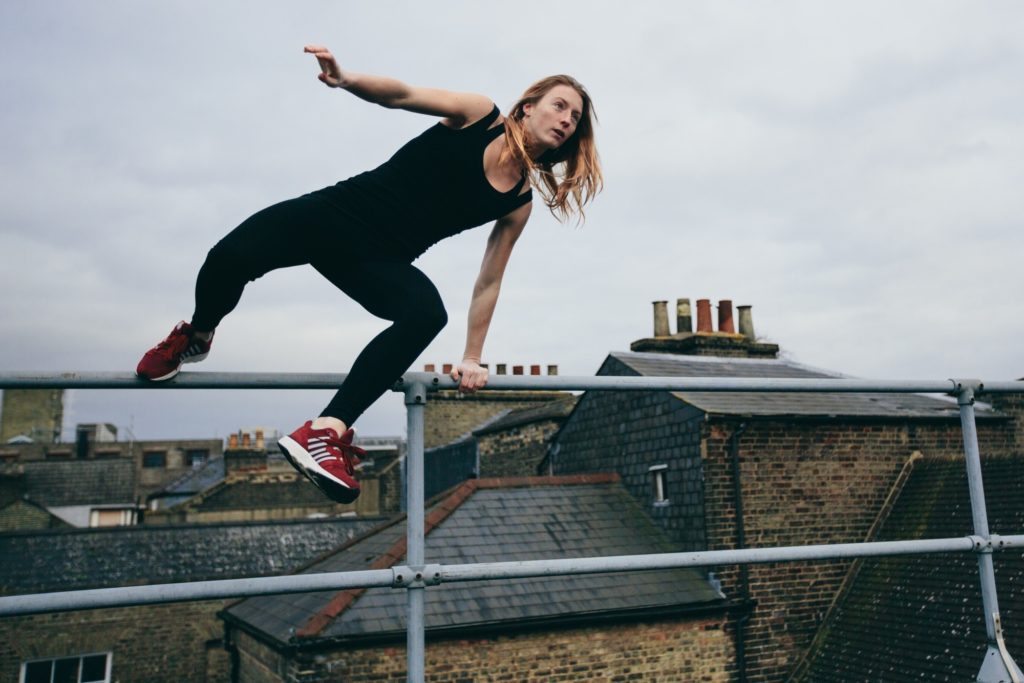
Below, we have listed some classes, courses, or jams that occur to help promote the inclusion and practice of parkour for those groups.
Nova City – On August 1st of this year, at their venue, Nova City ran a jam to allow Women of all ages from around the UK to train together in a safe environment.
During the day we had Workshops from professional athletes Rachel Gough and Elise Bickley. This event was also featured on ITV news.
On their website, Nova City state;
When we return to normality we will be hosting some girls only introductory sessions, workshops with some of the country’s top female athletes and creating loads of media aimed at inspiring the next generation of young women to start their Parkour journey.
Train Hard – The Parkour Project – Dorset-based parkour coaching organisation Train hard run The Parkour Project in Poole. On a Saturday morning, they run a youth & adult women-only parkour session. This is for ages 16+ and is coached by Viv Jackson and her husband, Scott.
We posted an article earlier this year, which you can read here, which highlights the impact of Viv & Scott’s women’s parkour sessions.
One participant of these classes has said;
“I was super nervous…..but everyone has been really kind and friendly and you don’t have to be super fit or super mobile to do it. It [the class] comes with warm ups and all the drills that we do before we do any Parkour. “
The BBC also featured a piece covering and highlighting the success of Train Hard’s female-centered classes.
This Girl Jam – Hosted by Rachel Gough, an athlete who is sponsored by ‘The Motus Projects and has competed in numerous competitions.
Rachel hosts the ‘This Girl Jam’, which is a jam for women and non-binary parkour participants. This allows women to have a safe space to train or try the sport without the fear of judgment.
The jam is hosted annually, but Rachel has plans to try and host the jam on a more frequent basis.
Do you have any more tips for finding a community? Let us know your thoughts down below, and share this post with someone who might be trying to start parkour.
